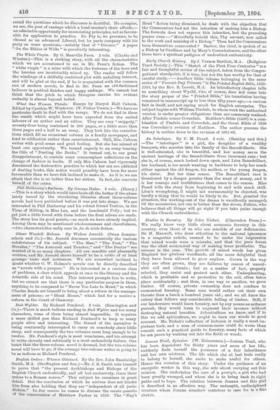Studies in Forestry. By John Nisbet. (Clarendon Press.)— We really
know very little about economic forestry in this country, even those of us who are sensible of our deficiencies. Sir H. Maxwell, who drew attention to the national ignorance in a magazine article, seemed to be under the impression that mixed woods wore a mistake, and that the pure forest was the ideal economical way of making trees profitable. The reverse is the case. The growth of mixed woods has given England her glorious woodlands, all the more delightful that they have been allowed to grow anyhow. Grown in the way they are often grown, they are failures by reason of unsuit- able soil and climate ; but as a matter of fact, properly selected, they assist and protect each other. Underplanting, which is profitable and so protective to the soil, often takes place accidentally ; and thus, in one way or another, we grow timber. Of course, private ownership does not conduce to economical forestry. Some men would rather cut their own throats than a beech a hundred years old ; and we all know the outcry that follows any considerable felling of timber. Still, if our landowners would learn forestry, not by any means an arduous pursuit, they would learn to augment their incomes without destroying natural beauties. Arboriculture we know, and if to this we add sylviculture, we ought to turn our woods to good account. Mr. Nisbot's collection of lectures is really a most im- portant book, and a man of common-sense could do worse than consult such a practical guide to forestry, many facts of which he cala prove by walking out into the fields or woods.






































 Previous page
Previous page